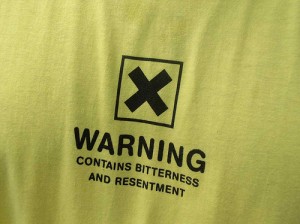Step 4: “Made a searching and fearless moral inventory of ourselves.”
So, one night, years ago, way before I was published, I left my critique group and I realized I hated one of the members. Hated her like the Devil hates puppies. This woman would open her mouth and I’d just want to hit her. So that night, around midnight, as I lay there, not sleeping, hating on her, I realized I needed to inventory why she troubled me so much. Because it’s a spiritual axiom; if I’m feeling upset, there is something wrong with me.
Above all, I wanted to be free from the resentment. Hating people is hard work, and I’m a busy guy.

So I got up, went to my computer, and here is a perfect example of using the 4th-Step inventory process to work through a resentment. I changed the name to protect the innocent.
I’m Resentful At:
Betty Smith
The Cause
I am resentful at Betty because her book was terrible, and yet she is so hard on my book, and she knows so little. She thinks she knows all about young adult fiction and how young adults talk and she doesn’t. She’s mean and critical.
How does this resent affect my self-esteem, security, ambitions, personal relation, sex relations? What are my belief systems?
I am… worthless. I can’t write. I should give up.
I want…everyone to like my writing.
I need…to know I’m not wasting my time and that I do have an audience.
Pocketbook…None. Well, my future booksales might be hurt if she is right and that scares me.
A Real Man…should give up if they can’t do things perfectly. A real man wouldn’t embarrass themselves by showing the world subpar work.
A Real Woman…only wants a man who does things perfectly and doesn’t want to see any weakness or imperfection.
Where was I selfish, dishonest, self-seeking, and afraid?
Selfish
I am selfish because I have talent. Just like my daughter Asha has talents. Like my daughter Ella has talents. When I disregard my talents, it’s like Asha or Ella saying they are bad and wrong. It’s not the truth and it’s selfish and prideful for me to think I’m so awful. Like Dave said, “Quit talking bad about yourself.” It’s self-indulgent.
Dishonest
I am dishonest because I know I’m not worthless and I know I can write. I am the real thing. Like other published writers I’ve read. I’m also being dishonest with myself because deep down I don’t believe real men should do everything perfectly, and I don’t believe that’s all women want.
Self-seeking
I am self-seeking because I don’t want to write for an audience. I want to churn stuff out for my own sense of accomplishment, and then not show it to anyone. And it’s self-seeking to want to be the best, above reproach, above critique, so everyone will praise me and tell me how great I am.
Fear
I’m afraid that I’ll never get published. And I’m afraid that if I do get published, I won’t have an audience.
* * *
So that was the inventory. Since it was late, I waited until the next day to call a friend of mine. I then read over the inventory and shared what was going on with me and this woman. At the next critique group, I was free of Betty Smith and I could listen to her. She didn’t have to change, I did. Once I could see the triggers, I could let Betty be Betty.
She did me a service, even if she wasn’t very pleasant. I needed to think about an audience, even if it was just one person, and that’s what really got stuck in my craw. It’s an overwhelming idea and I was afraid. But once I worked through it, I felt better.
 Over the years, I’ve inventoried my hatred of other writers better than me, the whole writing industry, writing as an art form (lonely–at least being a musician you get to hang out in bars), people not liking my writing enough, feeling cursed by God for being a writer, and the list goes on.
Over the years, I’ve inventoried my hatred of other writers better than me, the whole writing industry, writing as an art form (lonely–at least being a musician you get to hang out in bars), people not liking my writing enough, feeling cursed by God for being a writer, and the list goes on.
There is no way I could have continued to write with all of the emotional baggage hanging over my head. I had to get to the other side, and for the most part, I did, but nothing is perfect. I relapse into negative thinking all the time and that’s why in 12–Step programs they say, “practicing the steps” or “working the steps.” In a very real sense, we’re never done.
Notice, part of the inventory process is the fifth step, sharing it with another person.
But we’re not done quite yet. Next week, we’ll talk fear. Don’t be afraid. I’ll be right there with you all the way.



